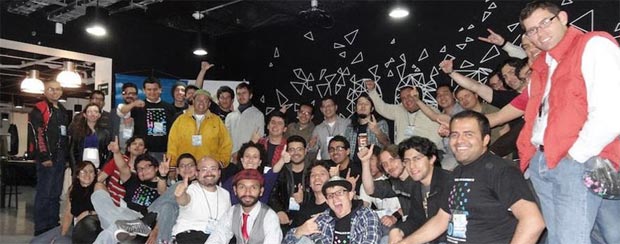This article was cross-posted from the blog of the engine room
Transparency International recently awarded grants to TI country chapters with ideas for mobilising more people in their countries around anti-corruption campaigns. The common thread among these new initiatives was a clear recognition of the potential that web and mobile-based technologies have to engage people. Each project faces a distinct set of challenges. Learn more about them below – and get in touch if you are interested in becoming involved. Each project is still in development and the majority aim to go live before June.

Most of the ideas were developed in Transparency International’s first global hackathon which took place in October 2012
Shedding Light on Political Party Funding in Sweden: Open Funds will rank parties according to their level of transparency using a set of 9 indicators. To put more pressure on political parties, they will create graphics to visualise the indicators and spread these graphics through a Twitter campaign. Their biggest obstacle will be building a critical mass of engagement around the project. To do this, they’re looking for allies in Sweden with social media and digital marketing expertise.
Monitoring Local Councils in Chile: Munidatos – developed by the team at Chile Transparente – will aggregate and visualise data about the activities in all 345 local councils in Chile. By making the data more accessible, the initiative aims to play a role in creating a more informed Chilean citizenry. As with Open Funds, Munidatos’ main challenges include finding ways to drum up enough interest to ensure that people know about it.
Surfacing Data About the Slovakian Judicial Performance: The Slovakian chapter is hard at work building a system of indicators to rank judges according to how transparent and accountable they are. In addition to finding all of the necessary data, their main challenge thus far has been finding the best methodology to create representative indicators of judicial performance. Data analysis geeks should get in touch with them.
Citizen Monitoring of Public Works Projects in Perú: Proética is building an application that brings together various, distinct transparency tools provided by the Peruvian government to make data about public works projects more accessible and user friendly. Once the tool is ready, Proética will pilot it with an existing network of anti-corruption allies throughout the country.
Rewarding Doctors that Don’t Ask For Bribes in Ukraine: Aybolit will encourage Ukranians to send in reports of positive experiences with health services. The goal is to reward medical institutions that do not solicit bribes. Their thinking is that hospitals will want to stand out as less corrupt in advance of an upcoming restructuring of the national health system, which may shut down certain hospitals.
Mobile Gaming Against Corruption in Hungary: The Hungarian chapter of TI is developing two new mobile games. One, Cheat or Starve, guides users towards learning about how corruption undermines a community. The team’s main challenge will be ensuring that their games, though introducing serious content, are actually fun to play. They are also looking to form strategic partnerships and are building an outreach plan that will include collaborations with schools.
Focusing on Mobile in Zimbabwe: Online platforms don’t make a lot of sense when internet penetration is less than 12%, but technology is still a potentially useful tool to engage more people with anti-corruption activities. In the case of TI-Zimbabwe, they are soliciting reports of experiences with corruption using SMS. These reports are then channelled to the TI ALAC Center.
Citizen Monitoring of Anti-Corruption Courts in Indonesia: TI-Indonesia will be adding to itsexisting citizen corruption reporting work by creating a tool to monitor ongoing anti-corruption court cases. Users will be able to observe the progress of cases and then rate verdicts. The aim is to mitigate widespread distrust of the judicial system. Their biggest challenge is finding the resources to push the tool out to a wider audience.
Monitoring Faulty Infrastructure in Cambodia: In what will be the Transparency International movement’s second adaptation of the “Fix My Street” model (TI-Georgia has pioneered this), TI-Cambodia is building an online platform for reports of infrastructure issues. Called Cherybelle, it was built at the global hackathon held at the end of 2012. As with many of the innovation projects above, Cherybelle has a sense of the users they will target – youth – but face hurdles in mobilizing them to participate.
Crowdsourced corruption reporting in Malaysia: Malaysia is one of many chapters interested in integrating online reporting platforms into their work. It can be a useful outreach tool, but especially if it is paired with a strong community engagement strategy and the organization’s existing programmatic work.
Strengthening the Impact of Crowdsourcing in Macedonia: Online reporting platforms can be a great outreach tool for Transparency International chapters looking to engage more people with their work. These platforms likely have greater impact when integrated with existing programmatic work, such as Advocacy and Legal Advice Centers (ALACs). ALACs channel incoming reports to appropriate institutions in order to solicit responses. The team at TI Macedonia will be working to create an application that will seamlessly integrate their ALACs database with their Ushahidi platform.
As you can see, most of these initiatives focus on enabling public access to information. Enabling easier access to data is incredibly important. However, for these projects to generate public pressure for greater transparency and accountability, they will have to engage and mobilise people – not just improve access. If you have the right skills and the interest to join in and provide expertise or support to any of these initiatives get in touch.















 Connect with us on Facebook
Connect with us on Facebook Follow us on Twitter
Follow us on Twitter